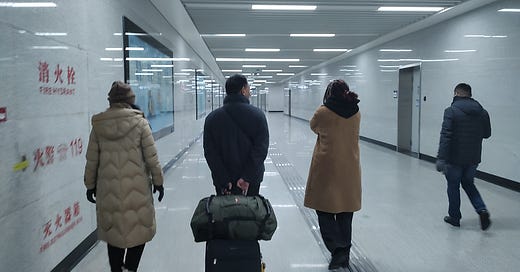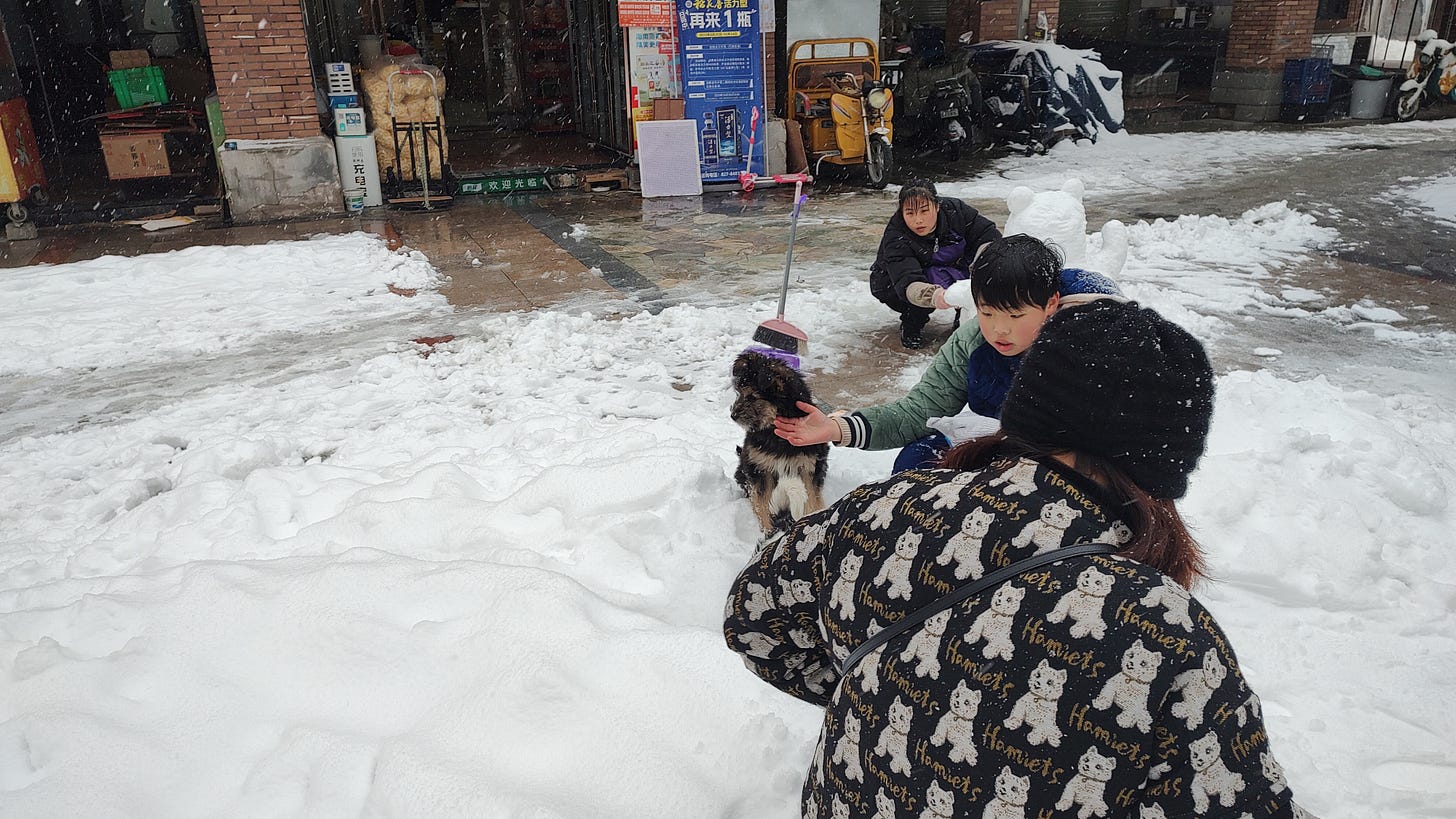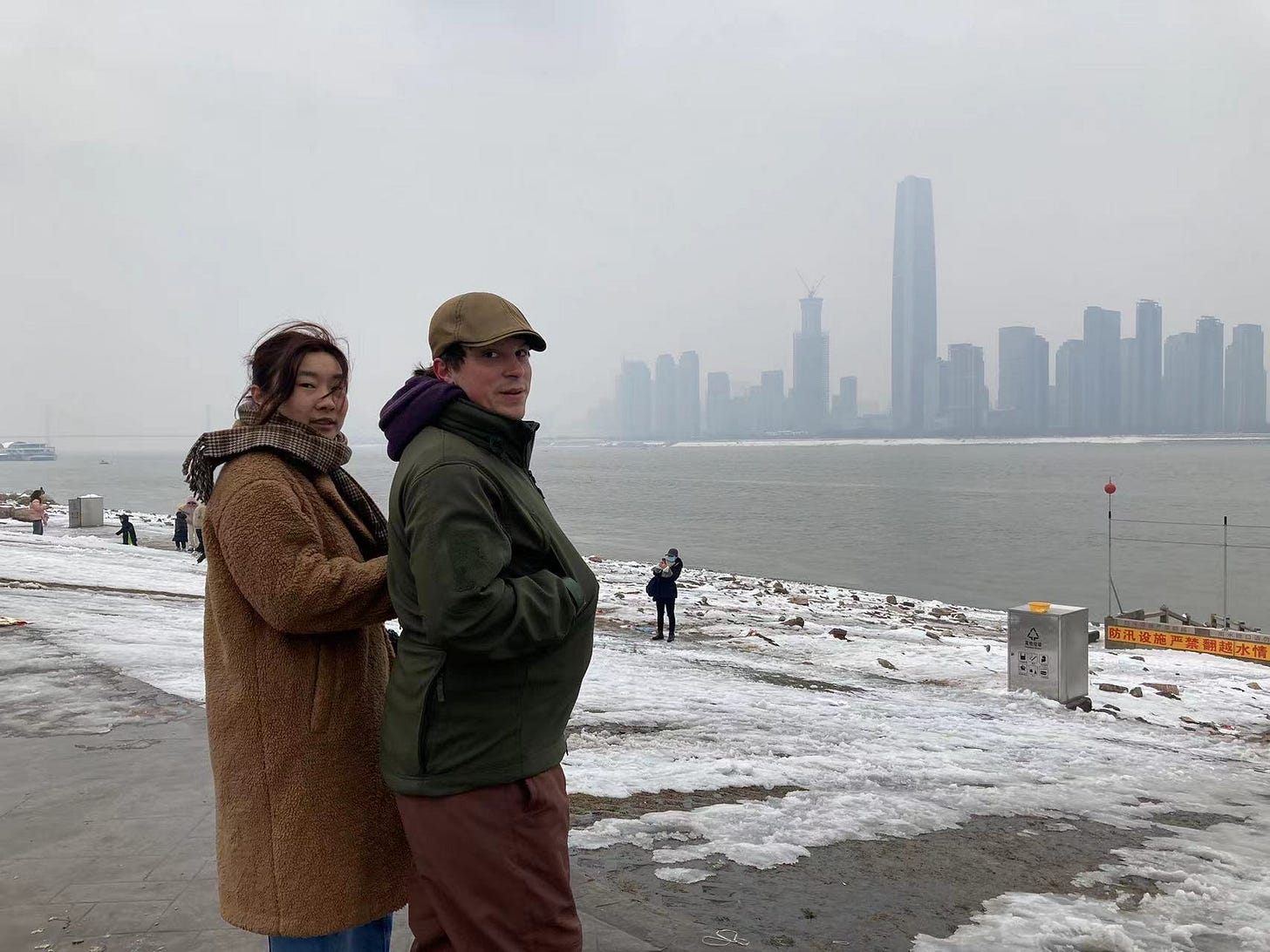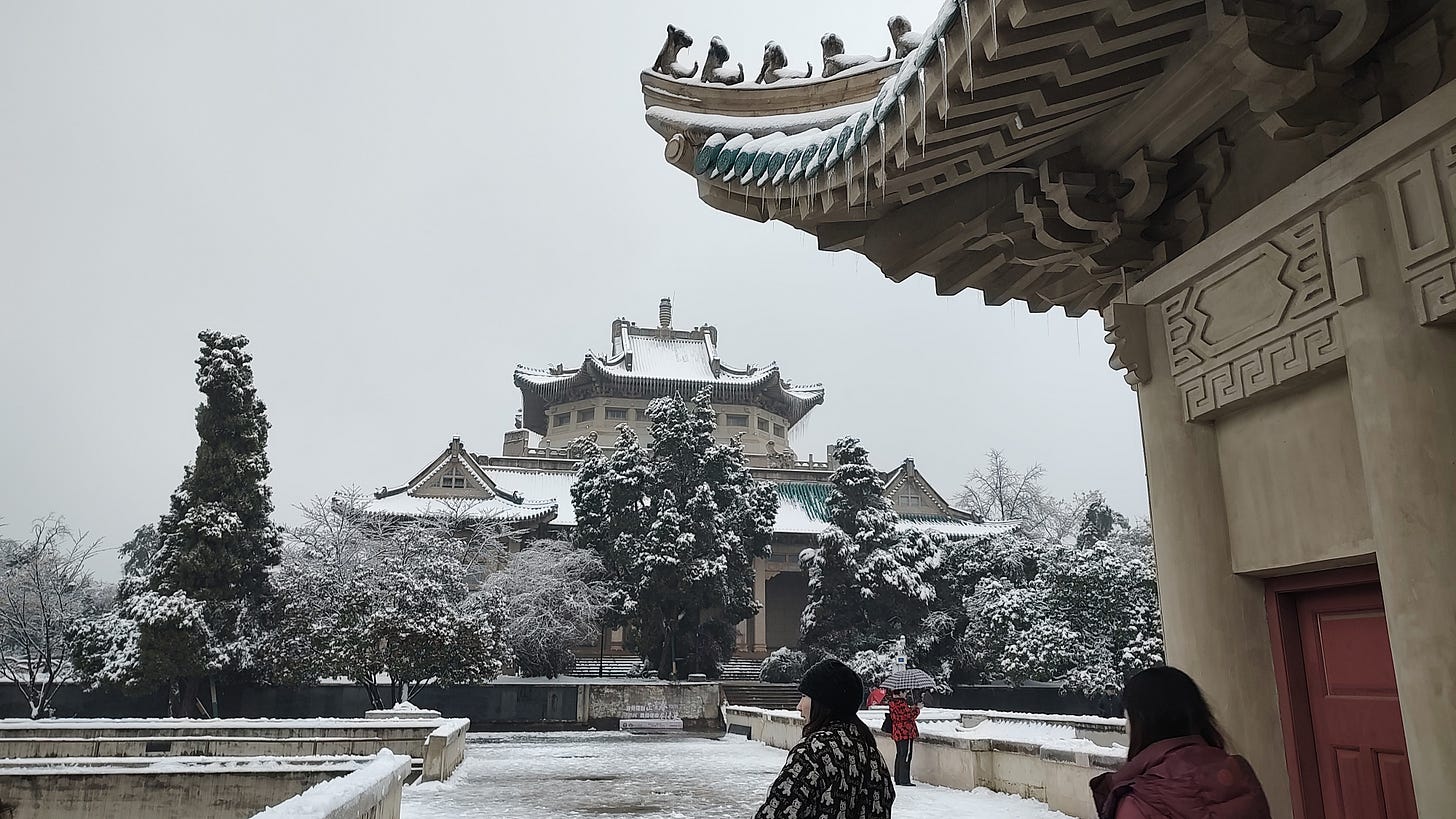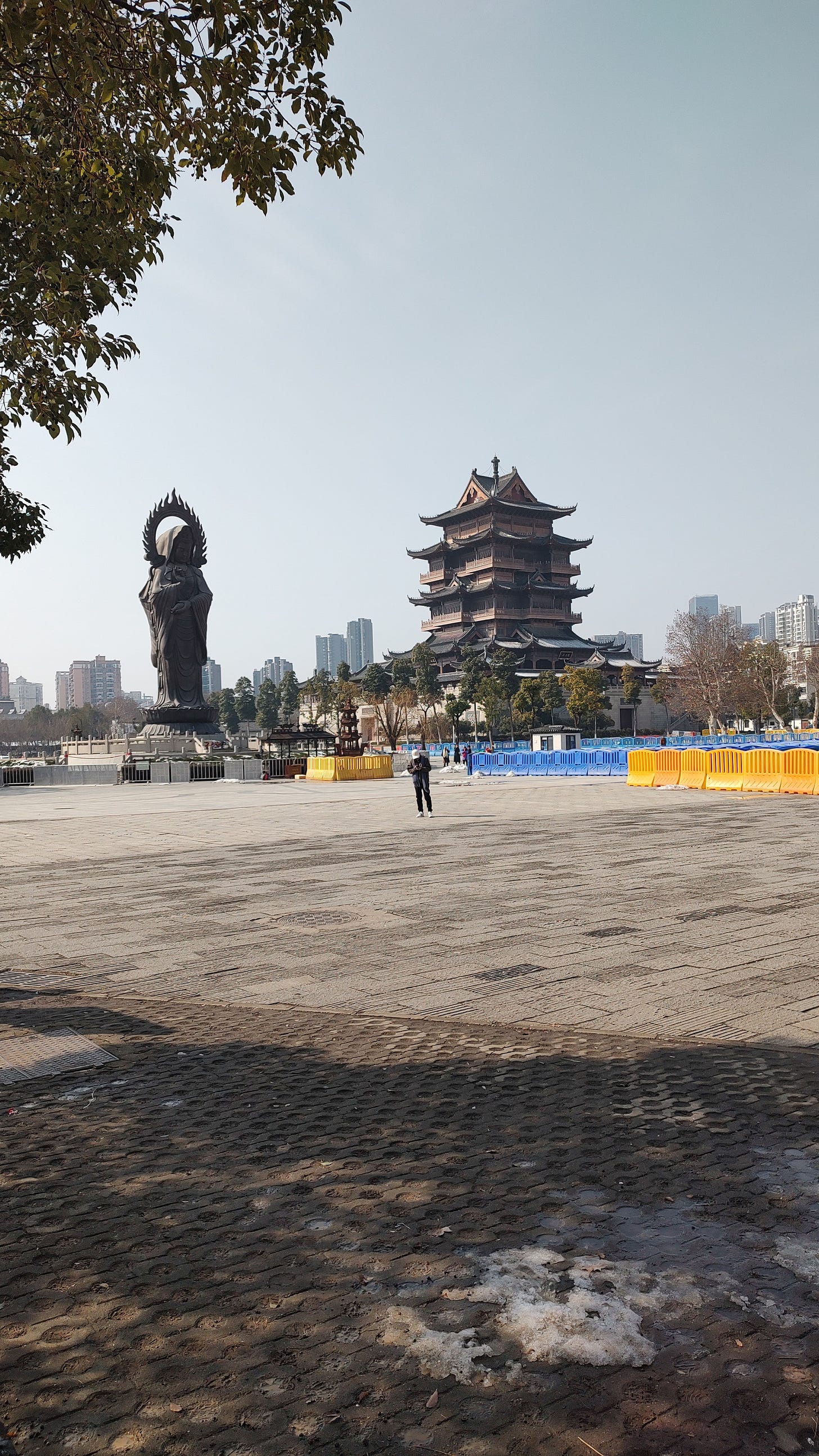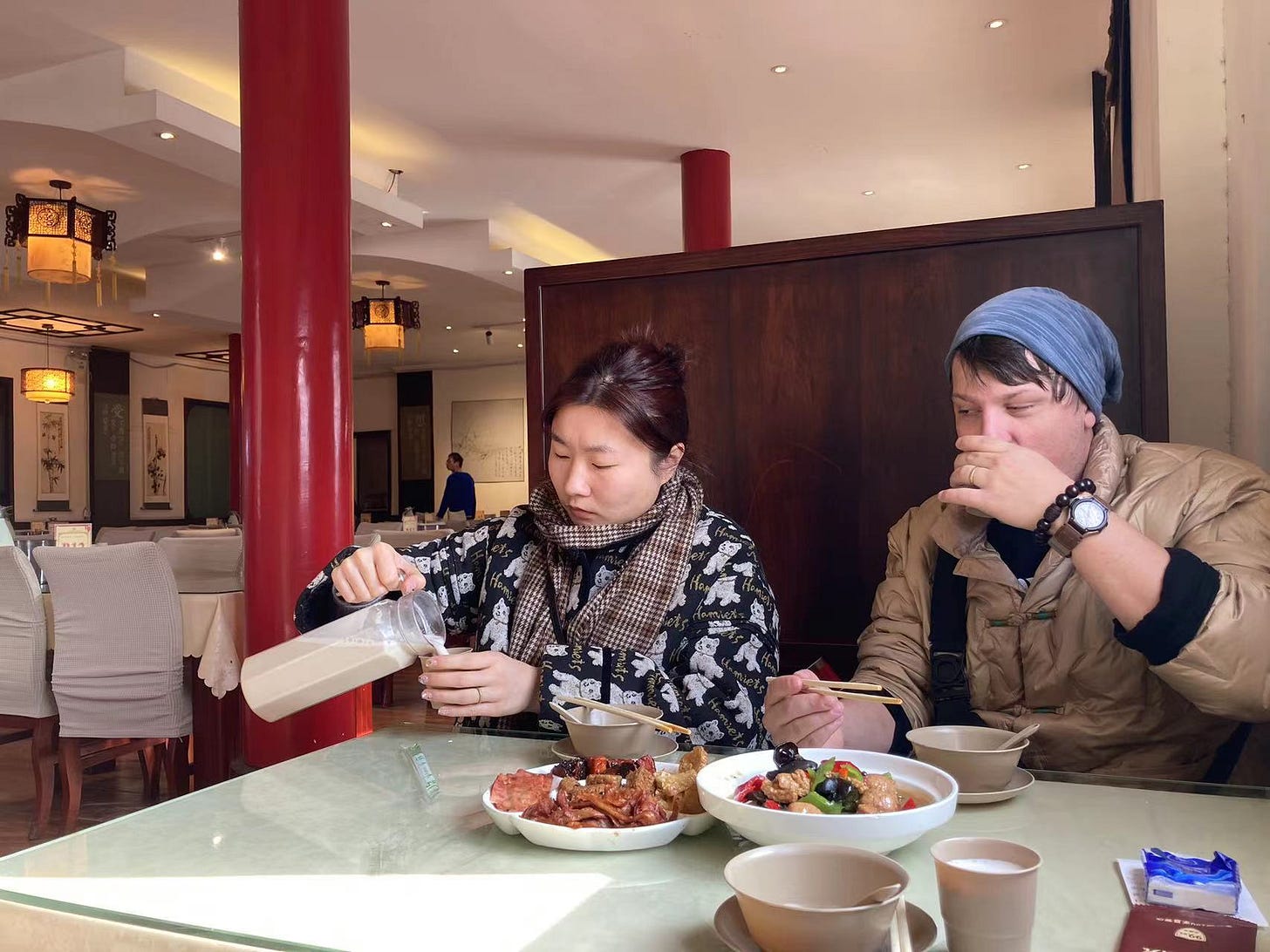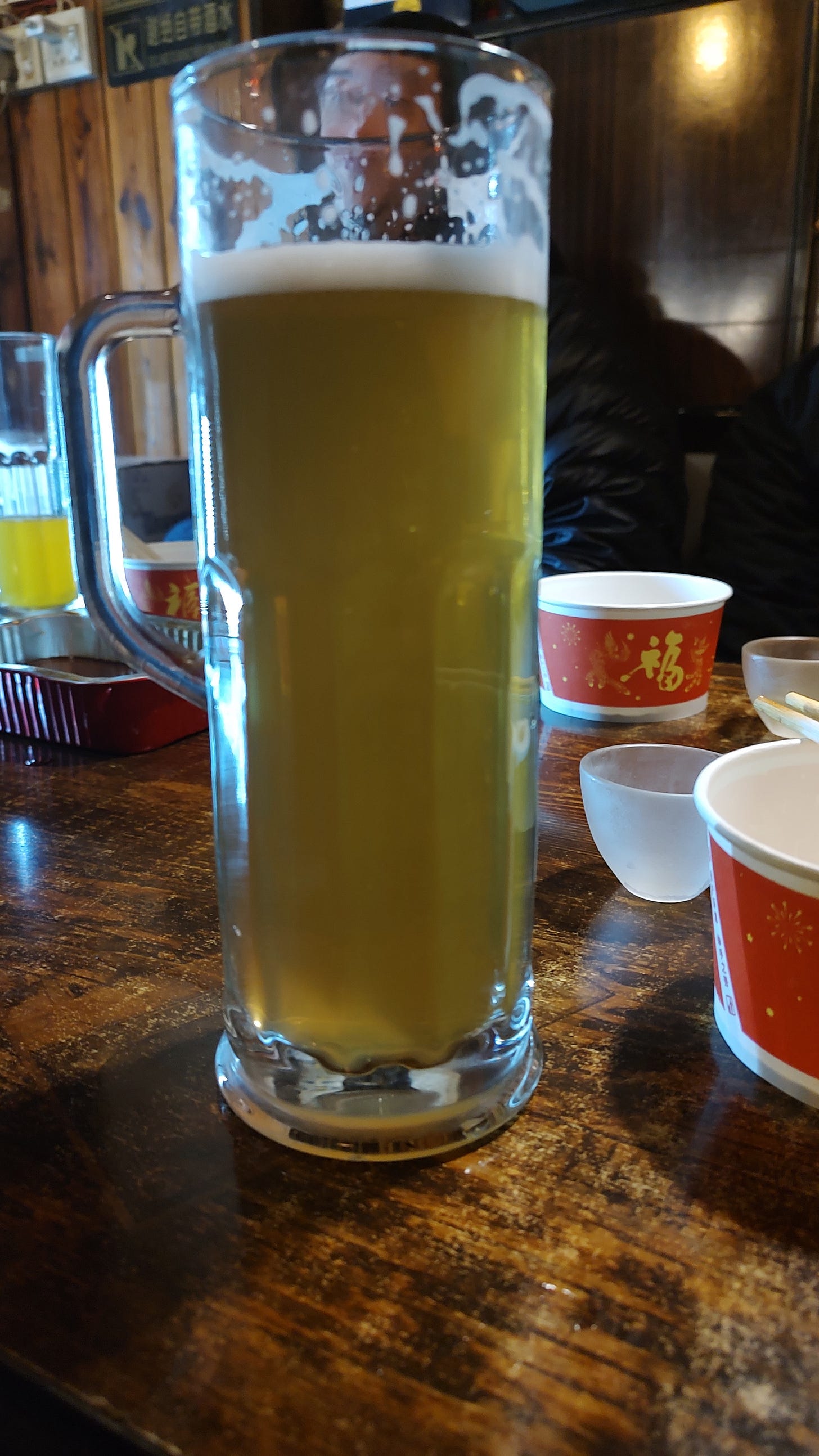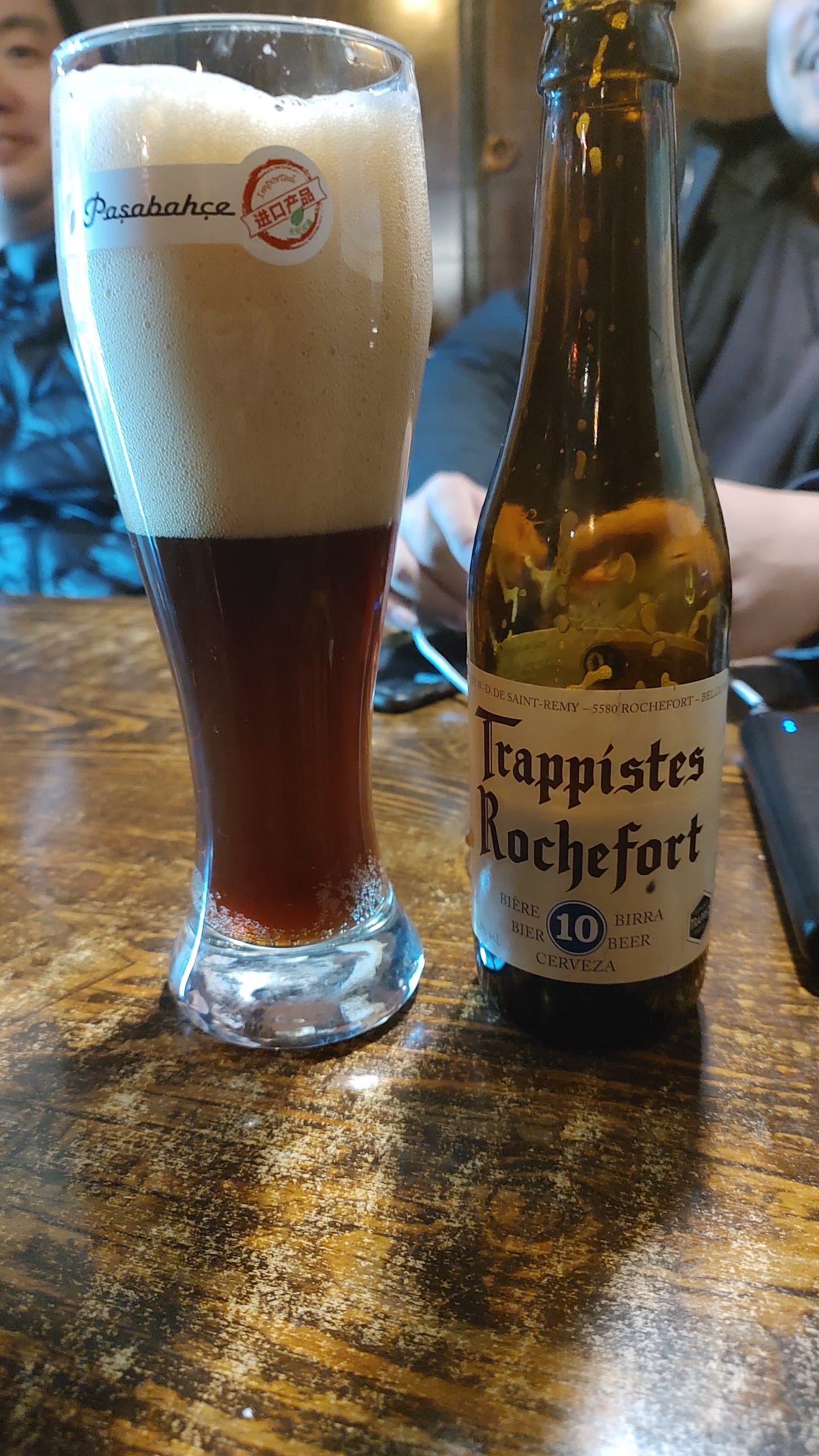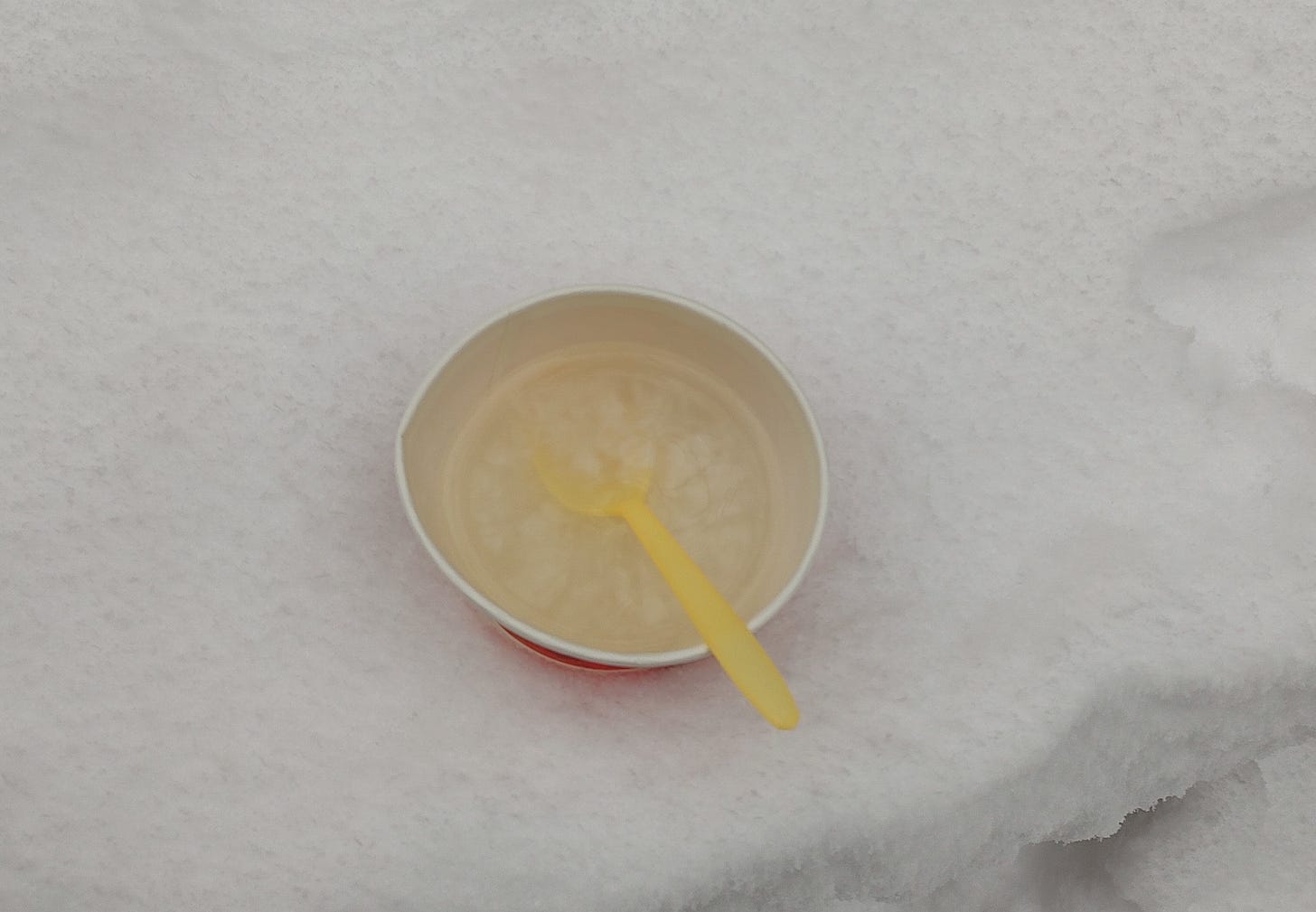Note for my readers. I had previously posted this in three parts when I first started this publication. I have since edited it and combined into into one piece. I think this version flows better and reads better than it broken into three parts. I hope you enjoy your reread or reading it for the first time!
Noodles
Stepping off the plane into the terminal after a grueling transatlantic flight felt like walking through a dream. Not even sleep-deprived, sleep-starved and overly lubricated on over-steeped black tea, we find our way to baggage claim and then out into the icy air.
There, I am meeting my mother and father-in-law for the first time. For them, it’s just another day. For us, it’s been nearly two days of travel. Our greetings are a little awkward, but exhaustion smooths over any social missteps. I am exhaustedly excited, running on fumes but fueled by adrenaline and the surreal weight of finally being here.
From the airport, we navigate the byzantine maze of subway tunnels toward our destination. Home. At least, home for our time here.
Outside, the city is blanketed in fresh snow, remnants of a massive late-season storm that hit uncharacteristically hard. The sidewalks are slick, frozen over in the early morning hours. My senses are on overload, everything is new, foreign, and strangely familiar all at once.
Before I know it, I’m climbing a dystopian set of concrete stairs to the fourth floor. Cold. Brutal. Unforgiving. And then, warmth, system shock.
The apartment pulls me in, shaking me loose from the whirlwind of travel I can barely remember. The house, a little warmer than outside, is pristine, well-arranged. My mother-in-law is a woman who likes nice things and a clean house. It’s comforting, orderly, a stark contrast to my current state, jet-lagged and unraveling at the edges.
I can hardly take it all in before my brain turns to gooey sludge, like congee left on the stove for too long. I am shown the bedroom. The last thing I remember is sitting down on the bed. Then, darkness.
Mere hours later, I awaken from my dead-to-the-world slumber. We step outside of our new, temporary home. The concrete steps descending from the fourth floor emanate a foreboding frosty glow. As we step from the shadows of the building, we are greeted by the crunch of old and fresh snow. Strange and foreign scents of fallen trees belie their broken forms, cracked under this freak snowstorm. Yet, as we leave the gate to our little community and step into the street below, the air is alive with the smell of food, the hum of people, and the ozone burn of passing vehicles. My first morning in this foreign land. My first awakening to this city of food and history. This is Wuhan.
It’s colder now than when we arrived hours before, with more snow on the ground. The melting drifts reveal destruction left in the wake of the unprecedented snowfall. Trees stand stripped of their limbs, a grotesque homage to a low-budget slasher film. The ground is littered with their severed limbs, snapped apart like a chicken leg from a first-year culinary student. The haze has descended on the city, and I am starting to feel that acrid tinge on the back of my throat, a scratchiness that seems to never leave.
Our journey lies to the South, towards the grandmother. Our first meeting. My lucky day, it's on the first floor. After a short rap on the door it opens to a middle aged man who greets my wife and I enthusiastically. We exchange quick ni haos as I am led towards the couch in the living room. It is her uncle, my uncle now I suppose, and sitting on the couch next to us is Grandma Yuan. Trapped in a scene from a Stephen Chow movie, the choking tang of cheap cigarettes and the burn of too-strong baiju invade my senses as I sit at a worn coffee table in a Soviet-inspired block apartment. My wife is doing her best to dissuade her grandmother from offering me another cigarette, which she wants to light with a revolver-shaped butane torch. Her uncle, already deep into his second bottle, gestures for me to join him in a toast. It’s barely 10 a.m. My first breakfast in China, a cigarette, booze, and danjiu, rice wine served warm with egg.
We venture into the melting city to hunt for more food, one of the culinary masterpieces hidden from the outside world. Re Gan Mian. Wuhan is known as the city of breakfast and the city of carbs. You’ll need them. Wuhan is unfathomably walkable for my Texan sensibilities. Over the course of this trip, I would amass enough miles to cover a good chunk of the Appalachian Trail.
Dodging the Formula 1 bus drivers, giant puddles, and a sea of pedestrians, the city opens up to us with great potential. Everywhere you look, some kind of food stall is dishing out local fare and even things from far away.
The first noodle shop is closed, Auntie, no doubt, has taken off to spend time with her family during the New Year. Another metal garage door is open, and the Uncle deftly fills his orders with a natural grace that defies his years. Finally, a bowl of what I have been craving, steaming Re Gan Mian. This fantastic blend of noodles, sesame sauce, broth, and pickled vegetables kicks with a subtle spiciness.
For those unfamiliar with this dish, Re Gan Mian translates to “Hot Dry Noodles”. It is a Wuhan specialty. As with any place boasting a proud food culture, Wuhaners are fiercely protective of their way of eating it. There are right and wrong ways, entirely subjective and often determined by what side of the river you’re from.
The noodles must have bite, what the Italians would call al dente. The sauce and vegetables come on top of the hot noodles in a paper cup. It’s up to you to mix them in. My wife, a native and from the right side of the river, has decreed: pickled green beans and green onion only. Mix with the short, packaged chopsticks and gobble it down.
I can feel the eyes of the Uncle and the other patrons burning into me as I take my first bites. They wonder how this Lao Wai in their sacred space is going to react to their cuisine. Its smooth, nutty sesame flavor only slightly masks the salty broth underneath. A subtle heat from the peppers tickles my nostrils and dances on my tongue. On this frigid morning, it’s exactly what I need to kick-start my endothermic reactor and fuel my day of walking.
It takes a lifetime for many monks to reach nirvana, if they ever truly do. I am convinced I have found the secret. It’s these simple, peasant dishes that transcend every single meal I ever made in my years as a fine dining chef. The flat circle of perfection is not a pristine, round plate with three ounces of foie gras and a $100 price tag. It’s this cup of noodles, maybe 60 cents, a blissful amalgamation of salt, sugar, fat, and starch that chefs spend decades trying to master. It’s cheating in every sense of the word, and I am here for it.
In these moments, I am reminded of Jimmy Yang’s joke about Western chefs vs. Cantonese Uncles. Look it up. It’s hilarious. And true.
We head back towards our apartment, navigating paths people have cleared through the rolling banks of snow. There are more people in the streets now, those going to work, families playing with their children, dogs prancing through the snow, and scooters starting to roar off into the thickening pulse of the street. Those many flights of concrete stairs greet us at the base of the building. Slightly warmer now from the happy soup of noodles and baiju swimming in my stomach.
Hot Pot
After clearing enough face-tracking checkpoints to make Orwell blush, we hop on the underground people mover. It is relatively new to the city, a testament to the monumental urbanization projects that China has undertaken in the last several decades. Our next stop is the Wuchang District, home to Wuhan University, my wife’s alma mater, where we meet a group of her old friends from the city. They catch up while I fall behind, soaking in my surroundings in this alien place.
I will admit, I haven’t stepped foot on many university campuses. But I imagine that many don’t hold a candle to this sprawling labyrinth of new and old, useful and decorative. The old palatial structure looming over the campus from atop the hill harkens back to some imperial dynasty, though it was designed by an American, F.H. Kales. Beyond a name, I can scarcely recover any information on the man, but his work suggests a fascination with blending Western and Chinese architectural principles.
The palace grounds are expansive, their cold, hard stone foundations steeped in history, reflecting an older way of life. Massive, steep stairs ascend to the top of the parapet, where you can look out over the campus like an ancient warlord surveying their domain. Here, the university houses its graduate students, possibly as some cruel training regime to keep them depressed and fit.
As we descend the steps, returning to the reality where I am not a feudal lord, my stomach rumbles. The noodles from breakfast are a distant memory, my energy-starved muscles struggling to keep up with these superhuman walking machines.
Back to the tube, another zip through the underground toward downtown. Our destination: one of Wuhan’s many malls, the kind of malls we used to have in America, thriving centers of commerce and social activity. An eerie reminder of a culture we’ve lost in the West.
Back home, the malls of my youth are barren wastelands of empty cavities and rotting corpses of a time long forgotten. In China, malls are theme parks of designer clothes, bubble tea shops, playgrounds, and rooftop zoos. The world’s current largest mall is in this city. We don’t even need to exit the underground onto the street, it goes right inside this sprawling mega palace of gluttony and sin.
I am bombarded by an overload of people, lights, designer brand signs, kiosk salespeople, and sheer chaos. As we exit the escalator onto the third floor, I catch a woman letting her toy sized dog take a massive shit in the middle of the mall. She walks on, leaving a fresh pile of steaming dog turds for everyone else to navigate. Luckily, our destination is a floor above us, hopefully far from any freshly laid landmines.
It seems that every mall we visit on this trip has the same formula. Shops on the bottom and food on top. We have arrived at the fourth floor. The food court, as we in the West would call it. This is a smorgasbord of options ranging from the invasive giants of American fast food to upscale restaurants. Our destination is a hot pot place, a good one I am assured.
Hot pot isn’t just a meal, it’s an event. A bubbling, hissing, communal cauldron of history, culture, and camaraderie, sitting in the center of the table like a molten altar to gluttony. It’s where friendships are forged over scalded tongues, where lovers bond over perfectly cooked slices of beef, and where the weak are revealed as they fumble their fish balls into the depths, never to be seen again.
In China, they do hot pot like they do everything else, with style, with purpose, and with the kind of deep, ancestral knowledge that makes you feel like you’ve been doing it wrong your whole life. Chengdu’s version is a fiery red hellbroth of chili oil and Sichuan peppercorns, numbing your lips before the first bite even lands. In Beijing, the pot is a brass urn of bubbling broth, fueled by charcoal, with paper-thin lamb swirling into buttery tenderness. Across Asia, from Japan’s delicate shabu-shabu to Vietnam’s seafood-laden lẩu, the concept remains the same: take good ingredients, cook them yourself, and revel in the madness.
There are rules, of course. You don’t just dump everything in like a barbarian. The meats go first, thin slices of beef or lamb, kissed by the heat for mere seconds before being rescued, dipped, and devoured. Vegetables next, soaking up the broth, transforming from the mundane into something ethereal. Noodles last, drunk on the flavors of everything that came before.
And then there’s the dipping sauce. Some prefer simplicity, a raw egg cracked into soy sauce. Others craft elaborate concoctions of garlic, sesame paste, scallions, vinegar, and chili, creating a sauce as personal as a signature.
But the real beauty of hot pot isn’t the food, it’s the people. You don’t eat hot pot alone. It’s a social contract, an understanding that for the next two hours, you’re in this together. You reach across, clink chopsticks, steal a shrimp when no one’s looking. It’s chaotic, messy, deeply satisfying, just like life.
At the end of the night, you’ll be sweating, stuffed, possibly nursing a mild burn, and already thinking about when you’ll do it again. Because you will. There’s no escaping the call of the cauldron.
Bloated and sluggish, we seek out something to wake us up. Enter the strangest rooftop attraction I’ve ever seen.
A petting zoo.
Filled to the brim with exotic animals that would collectively enrage all of PETA. I relax with a green budgie who takes a liking to me once he realizes I speak bird (I used to own budgies). But the highlight of the whole circus is the white fox. A small menagerie of zoo-goers queue on the open roof, waiting for their turn to hold the fox and get a picture taken.
I feel for the animals here. Many are probably stressed, mistreated, and solely here for the profit of the business. But how often do you get to pet and hold a white fox? Any fox?
Energy renewed with a furry vigor, we venture back into the mall. My wife and her friends dive into the vibrant consumerism that has swept the country and propelled its economy into the stratosphere. Before the first clothing store, my wife points out the sprawl of husband chairs, an array of semi-enclosed full-body massage chairs strategically placed outside the largest stores.
It is here that the great migration of men begins, each retreating to their padded sanctuaries while their partners hunt for deals in the wild expanse of Zara and Uniqlo.
I cocoon myself in and select the longest, most indulgent session available, this is self-care by robot. My weary body is bombarded with the mechanical imprecision of rollers and balls, and I am whisked away to that delicate cusp of sleep, until an abrupt end to my pleasure snaps me back to reality.
For the first time since arriving in China, I am acutely aware of being alone.
I know how the white fox must feel: handled, stared at, out of place, unsure when it can return to something familiar. This sudden awareness of my otherness hits hard. To be surrounded in a place where I don’t speak the language, don’t know the customs, and don’t even have the ability to pay for things on my own. My only lifeline is a WeChat text to my wife.
"Are you done yet?"
Part III: Skewers
The eve of the Lunar New Year. The city holds its breath before losing its collective shit. Breezing my way like a pro, through the underground we are in the Hanyang district. After a little over a block, we are at the walls of the Guiyuan Temple. This is the most prominent Chan Buddhist temple in Wuhan. A legacy of an ancient time in an ancient place.
Though China today stands as a modern giant, it was only a generation ago that most families lived as peasants, steeped in superstition and survival. The old ways haven’t vanished, they have simply made room. In a mere flash of time, China has transformed itself from a country of agrarian farmers to a country of industrial and scientific might. But the old ways linger, the old ways die hard.
Today, early birds are coming to perform their rituals before the mass of people on the morrow’s service begins. I join my wife in purchasing some incense before we stick their lit ends in the massive sand beds that stretch out before the central statue. We leave it as our offering to the Buddha for good luck and prosperity in the new year to come.
Built in 1658, the temple grounds are old, ancient even, especially by my American standards. As we tour the grounds and the various buildings we find the arhat house. A house dedicated to those who have achieved enlightenment and have since passed on. Each Arhat has a specific number and designation to them. While everyone has a different method, the tradition is to somehow arrive at a random arhat. Then you can visit the little window outside the house to receive your fortune, for a fee of course. I am not a religious man nor one to subscribe to superstitions. Neither is my wife, but this is her culture and a tradition she practiced as a child. I indulge her in this game. Truly random for me, as while I understand the numbers I cannot read the placards of Mandarin characters that tell me what each Arhat represents. I arrived at my favorite number. A random number that is not significant in any way other than to me.
Outside the house, we go give the lady our numbers. She hands each of us a golden card with our arhat and fortune for the new year. Mine is the arhat of the black cat. Which, for those who know me, is an awesome coincidence. I am immediately skeptical of my atheism, as if the hand of Buddha himself reached down to tell me something. I only had to listen. A brief delusion, but a happy accident on my part. I laugh. I shouldn’t believe in fate, but damn it, if this isn’t a wink from the universe. Just this once, I let myself believe it means something.
Once again, I am getting hungry. We finally reunited with my mother-in-law who was off doing her own rituals in this place. The temple has a restaurant tucked into one of the corners of the grounds. It serves vegan dishes, as this is a Chan Buddhist place, but unlike the vegan fare I am used to in the states this is a cuisine that is old, tried, and tested. One that has survived centuries of people consuming it. It has had time to become its own thing instead of trying to imitate the largely carnivorous diet of your average American. We eat quietly, bowls of mushroom broth, tofu skin, and perfectly seasoned root vegetables that taste like they’ve been loved for generations.
Later that evening we caught up with my wife’s best friend, Song. Song is a gay rights activist in a deeply anti-lgbtq country. A place where you can get disappeared with little to no consequences for the government. Yet, despite this, I found that Chinese people just don’t really care. Much like in the West, it's the older people who seem to have issues with it. Everyone else is trying to keep to themselves and live their lives.
Song is a jovial man, quick-witted and full of life, someone I would later come to deeply respect for his courage and his work. He jokes easily, laughs often, and carries himself with a kind of effortless confidence that makes you feel at ease. It’s easy to see why my wife calls him her best friend. There’s a bigness to him, not in stature, but in spirit. He’s the kind of person who refuses to shrink himself for the comfort of others. The kind of person who lives honestly, even when honesty is dangerous.
We are walking through one of the late night districts of the city. A place where younger people go out at night to find a warm watering hole and tuck in away from the cold air. Our travels take us past various bars, restaurants, closed businesses, and even a military base right in the heart of the city.
Our destination is tucked away on a little dead end street. Outside, the auntie prepares the grill for making skewers while her husband is inside pouring beers. This place is my kind of tiny dive bar, like a place I used to frequent when I was younger. A collage of tin tackers, stupid-funny pictures, movie posters, and a rustic wood vibe. The red leather booth seats suck us in as we fade away into one of the corners of this dimly lit place. I can smell the charcoal beginning to get hot wafting in from the open front door. The cooler next to our table is stocked with tons of German, Korean, and Japanese beer brands. Some I have never seen and others I can only find in the most boutique places back home. On tap though, homemade beer. The local stuff that is made right in the back.
My wife knows me and immediately orders me a tall glass. A few minutes later a tall pint of a gorgeous golden lager. Its fragrant nose has a hint of the ubiquitous flower, osmanthus, that every place in Wuhan seems to flavor something with. This is good, damn good. I am excited to see a growing craft beer scene in this place. A sign of a healthy society is one where small breweries can prosper.
After our first round is handed out, the skewers start pouring in. Auntie is busy, because we are hungry. Skewer culture, while less sophisticated than hot pot, is still an important element to the tapestry of the cuisine in China. Skewers are drinking food, like tapas in Spain or the bites you'd find at an izakaya in Japan. Meat parts, sometimes tofu or vegetables, seasoned on a stick and cooked over an open fire. As old and as simple as food can really get.
A savory array of various animals stream onto our table. Chicken, lamb, beef, pork, and even fish in the form of cakes. All the parts are here too, the delicious hearts, livers, and gizzards. I think there were some leafy greens in the mix, but they were a blur of unnoticed and necessary fiber to help pass the growing ball of protein through my colon. I order my second round of beer, a Belgian trappist.
While my wife and her friends carry on in conversation I am transported into my own thoughts. My own reflection on this moment. I am struck by a deeply humbling connection to my ancestors. This is what humans are meant to do. Forget all the reasons people think we created civilization for. It wasn’t bread, it wasn’t taxes, it wasn’t to gain power, nor to protect us from the barbarians on the frontier. It was beer and meat on a stick. We wanted more of that, more of what makes us human and makes us feel good about our place in the world. We wanted contentment.
I am haunted by how quiet the city is now. The buildings pass us like sleeping giants slumbering until morning. As mice, we tread quietly through their streets hoping to steal ourselves safely home. Even the subway doesn’t run at this hour and we must call a cab to get us home.
We say our goodbyes and part ways, my wife and I speed home in the back of an electric car that has come to pick us up. My thoughts are warm and drifting from the fleeting remnants of my indulgences on the local beer. My belly is bursting with enough meat to reassemble a small pig.
These moments don’t last. They never do. They’re paper cups: cheap, fleeting, and already starting to soften at the edges. But for a little while, they hold everything that matters.

